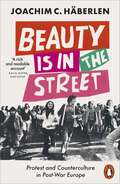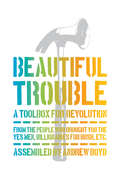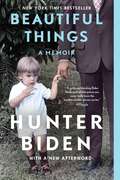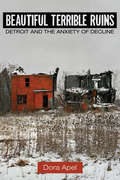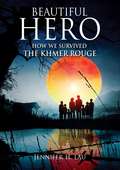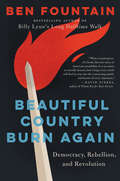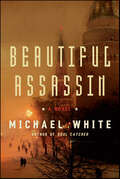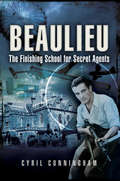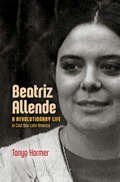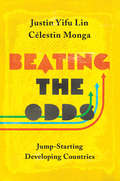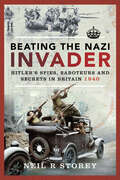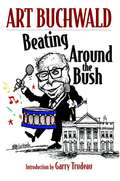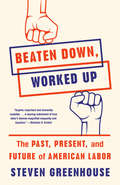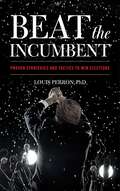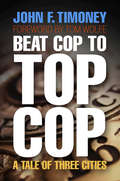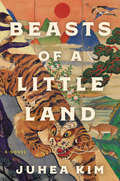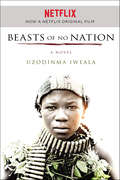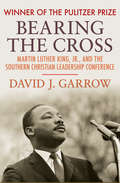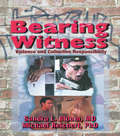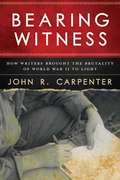- Table View
- List View
Beauty: Aurora's Sleepy Kitten (Disney Princess: Palace Pets)
by Disney Book GroupBeauty is a sweet kitty who loves to sleep, snuggle, and play with her best friend, Princess Aurora. Children ages 6 to 9 will love getting to know one of the Disney princesses' new Palace Pets in this book, one of a series of early chapter books that come with a collectible bookmark!
Beauty is in the Street: Protest and Counterculture in Post-War Europe
by Joachim C. Häberlen'A rich and readable account of left-wing activism in the West and opposition to Soviet-style communism in the East' Katja Hoyer, The Spectator'A dream, perhaps, but one that still sounds worth fighting for, even beautiful' Stuart Jeffries, The Observer'An ambitious and masterly account of utopian protest in Europe ... Fast-paced, with an eye for telling detail and written with a light touch' Robert GildeaIn post-war Europe, protest was everywhere. On both sides of the Iron Curtain, from Paris to Prague, Milan to Wroclaw, ordinary people took to the streets, fighting for a better world. Their efforts came to a head most dramatically in 1968 and 1989, when mass movements swept Europe and rewrote its history.In the decades between, Joachim C. Häberlen argues, new movements emerged that transformed the nature of protesting. Activism moved beyond traditional demonstrations, from squatting to staging 'happenings' and camping out at nuclear power plants. People protested in the way they dressed, the music they listened to, the lovers they slept with, the clubs where they danced all night. New movements were born, notably anti-racism, women's liberation, gay liberation, and environmentalism. And protest turned inward, as activists experimented with new ways of living and feeling, from communes to group therapy, in their efforts to live a better life in the here and now.Some of these struggles succeeded, others failed. But successful or not, their history provides a glimpse into roads not taken, into futures that did not happen. The stories in Häberlen's book invite us to imagine different futures; to struggle, to fail, and to try again. In a time when we are told that there are no alternatives, they show us that there could be another way.
Beautifully Unique Sparkleponies: On Myths, Morons, Free Speech, Football, and Assorted Absurdities
by Chris KluweHi. In your hands, right now, you hold the culmination of thousands of years of human intelligence, ingenuity, and brilliance. Now put your goddamn phone down and pay attention to my book. What is in my book, you ask? (I'm really glad you asked, by the way, because now I get to tell you.)Time travel. Gay marriage. Sportsballing. Futuristic goggles that DO NOTHING.Tiny brags from my publisher, stuff like: "This is an uproarious, uncensored take on empathy, personal responsibility, and what it means to be human."Excessive brags about myself: "An extraordinarily clever, punishingly funny, sharp-tongued blogosphere star, NFL player, husband and father, one-time violin prodigy, voracious lifetime reader, obsessive gamer, and fearless champion of personal freedom."Oh, and also an essay on the Pope's Twitter account. Honestly, if that doesn't draw you in, there's no hope left for humanity. I also give my own funeral eulogy, in case you were hoping I'd go away and die now!So please, join me in the glorious art of windmill tilting by reading this "collection of rousing, uncensored personal essays, letters, and stories" (I have no idea why that's in quotes).Join the herd of Beautifully Unique Sparkleponies.(You know you want to.)
Beautiful Trouble: A Toolbox for Revolution
by Andrew Boyd Dave Oswald Mitchell"Elegant and incendiary." -Naomi Klein. Beautiful Trouble brings together dozens of seasoned artists and activists from around the world to distill their best practices into a toolbox for creative action. Sophisticated enough for veteran activists, accessible enough for newbies, this compendium of troublemaking wisdom is a must-have for aspiring changemakers. Showcasing the synergies between artistic imagination and shrewd political strategy, Beautiful Trouble is for everyone who longs for a more beautiful, more just, more livable world - and wants to know how to get there.
Beautiful Things: A Memoir
by Hunter Biden“I come from a family forged by tragedies and bound by a remarkable, unbreakable love,” Hunter Biden writes in this deeply moving memoir of addiction, loss, and survival. <P><P>When he was two years old, Hunter Biden was badly injured in a car accident that killed his mother and baby sister. In 2015, he suffered the devastating loss of his beloved big brother, Beau, who died of brain cancer at the age of forty-six. <P><P>These hardships were compounded by the collapse of his marriage and a years-long battle with drug and alcohol addiction. <P><P>In Beautiful Things, Hunter recounts his descent into substance abuse and his tortuous path to sobriety. The story ends with where Hunter is today—a sober married man with a new baby, finally able to appreciate the beautiful things in life.
Beautiful Terrible Ruins
by Dora ApelOnce the manufacturing powerhouse of the nation, Detroit has become emblematic of failing cities everywhere--the paradigmatic city of ruins--and the epicenter of an explosive growth in images of urban decay. In Beautiful Terrible Ruins, art historian Dora Apel explores a wide array of these images, ranging from photography, advertising, and television, to documentaries, video games, and zombie and disaster films. Apel shows how Detroit has become pivotal to an expanding network of ruin imagery, imagery ultimately driven by a pervasive and growing cultural pessimism, a loss of faith in progress, and a deepening fear that worse times are coming. The images of Detroit's decay speak to the overarching anxieties of our era: increasing poverty, declining wages and social services, inadequate health care, unemployment, homelessness, and ecological disaster--in short, the failure of capitalism. Apel reveals how, through the aesthetic distancing of representation, the haunted beauty and fascination of ruin imagery, embodied by Detroit's abandoned downtown skyscrapers, empty urban spaces, decaying factories, and derelict neighborhoods help us to cope with our fears. But Apel warns that these images, while pleasurable, have little explanatory power, lulling us into seeing Detroit's deterioration as either inevitable or the city's own fault, and absolving the real agents of decline--corporate disinvestment and globalization. Beautiful Terrible Ruins helps us understand the ways that the pleasure and the horror of urban decay hold us in thrall.
Beautiful Hero: How We Survived the Khmer Rouge
by Jennifer LauWith only half a canteen of water and one baby bottle, a family of eight fought for their lives in the killing fields and land mines of Cambodia. Heroes emerge in the most unlikely places, under the most dangerous conditions. They are often the most ordinary of people facing extraordinary times. Surrounded by unimaginable adverse forces, one woman would ultimately lead her entire family to survive. Beautiful Hero is an autobiographical narrative told from a daughter's perspective. The story centers around Meiyeng, the eponymous Beautiful Hero, and her innate ability to sustain everyone in her family.Meiyeng's acumen in solving problems under extreme circumstances is thought-provoking and awe-inspiring. She shepherded her entire family through starvation, diseases, slavery and massacres in war-torn Cambodia to forge a new life in America.Over two million people--a third of the country's population--fell victim to a devastating genocide in Cambodia. The rise of the Khmer Rouge posed not merely a single challenge to survival, but rather a series of nightmarish obstacles that required constant circumvention, outmaneuvering, and exceptional fortitude from those few who would survive the regime intact.Beautiful Hero suspensefully unravels the layers of atrocity and evil unleashed upon the people, providing a clear view of this horrific and violent time of the Cambodian revolution.The story highlights the most basic impulses of man: good vs. evil, individual vs. group, democracy vs. tyranny, and life vs. death. It is the ultimate story of love, sacrifice, survival, and redemption--and lives pushed to the limits. It reaffirms the good in humanity by showing how one family lived and survived with grace and dignity.
Beautiful Country Burn Again: Democracy, Rebellion, and Revolution
by Ben FountainIn a sweeping work of reportage set over the course of 2016, New York Times bestselling author Ben Fountain recounts a surreal year of politics and an exploration of the third American existential crisis Twice before in its history, the United States has been faced with a crisis so severe it was forced to reinvent itself in order to survive: first, the struggle over slavery, culminating in the Civil War, and the second, the Great Depression, which led to President Roosevelt’s New Deal and the establishment of America as a social-democratic state. In a sequence of essays that excavate the past while laying bare the political upheaval of 2016, Ben Fountain argues that the United States may be facing a third existential crisis, one that will require a “burning” of the old order as America attempts to remake itself.Beautiful Country Burn Again narrates a shocking year in American politics, moving from the early days of the Iowa Caucus to the crystalizing moments of the Democratic and Republican national conventions, and culminating in the aftershocks of the weeks following election night. Along the way, Fountain probes deeply into history, illuminating the forces and watershed moments of the past that mirror and precipitated the present, from the hollowed-out notion of the American Dream, to Richard Nixon’s southern strategy, to our weaponized new conception of American exceptionalism, to the cult of celebrity that gave rise to Donald Trump.In an urgent and deeply incisive voice, Ben Fountain has fused history and the present day to paint a startling portrait of the state of our nation. Beautiful Country Burn Again is a searing indictment of how we came to this point, and where we may be headed.
Beautiful Assassin: A Novel
by Michael C. WhiteA breathtaking tale of love, loyalty, and intrigue set in the early days of World War II from the acclaimed New York Times Notable Book author of Soul Catcher, which USA Today hailed as "a marvelous historical novel"World War II threatens to engulf the globe. The beleaguered Soviets, struggling to hold back the rising German tide, face despair and defeat daily. Yet just as all seems lost, a fearless female sniper named Tat'yana Levchenko gains fame in the Battle of Sevastopol with her remarkable composure and stunning skill. Offering hope in her nation's darkest moments, she becomes a Soviet hero, and word of her beauty and prowess eventually reaches Washington, D.C. Soon, First Lady Eleanor Roosevelt invites Tat'yana to visit America and tour the country with her. For the Soviets, Tat'yana's newfound friendship with the wife of the most powerful man in the world is an opportunity to garner public support for a much-needed second front in the war—but it's also a chance to gather information about President Roosevelt's plans. Surrounded by those who would exploit her position, Tat'yana becomes a pawn in a battle for information, and she is forced to question the motivations of everyone she knows, including the American captain who has been assigned as her translator. But as quickly as she rises to fame, Tat'yana vanishes. Did she defect? Was she silenced—and if so, by whom? Decades later, a clever journalist will discover Tat'yana's story . . . and reveal the truth.In Beautiful Assassin, Michael White delivers a heartrending story of war, betrayal, and a mother's love that can never be extinguished. Lyrical, evocative, and powerfully moving, this is a tale you will not soon forget.
Beaulieu: Finishing School for Secret Agents
by Cyril CunninghamThis book is the outcome of a difficult investigation, and a very remarkable story it is too. It was at Beaulieu that a large number of agents from Britain and the Nazi-occupied countries of Europe were trained in the delicate arts of secret inks, coding, clandestine communications and black propoganda, along with such nefarious skills as silent killing, housebreaking, safe-blowing, forgery, unattributable sabotage and survival techniques. And they were taught by some extraordinary characters including former spies, a professional burglar and the infamous Kim Philby, who played a significant role in the design of the curriculum.
Beatriz Argimón: Aquí y ahora
by Rosana ZinolaA un año de su asunción como primera vicepresidenta de Uruguay, una aproximación a la mujer política y las circunstancias que la llevaron hasta allí. Beatriz Argimón encarna en buena medida las luchas y los desvelos de tantas mujeres que intentan abrirse paso a como dé lugar. A un año de su asunción como primera vicepresidenta electa de Uruguay, este libro es una aproximación a su intimidad, a su ser político y a las circunstancias que la llevaron hasta aquí. A partir de entrevistas exclusivas concedidas para esta publicación, este retrato integral permite conocer quién es verdaderamente la primera mujer en ocupar este cargo, y las inquietudes que corren por sus venas. La niña que escuchaba de sus abuelas historias de lanceras de Aparicio Saravia; la estudiante que acompañó a su padre al ser destituido por la dictadura y encontró un propósito en la actividad sindical; la llama de Wilson y la decisión de pasarse a la carrera política recién recibida; su trayecto en las estructuras partidarias topándose con lo mejor y lo peor de la vida política y sus peajes; su papel en la agenda de derechos y reivindicación de la mujer y de los más vulnerables, con las satisfacciones y los costos que esto le implicó; cómo llega a ser candidata y los sinsabores de la campaña; su vocación negociadora y el rol que desempeña hoy; su vínculo con el presidente; su quehacer cotidiano; los momentos más críticos del primer año de gobierno; su pensamiento y los desvelos de cara al futuro... El libro se completa con fotografías que recorren su vida y sus afectos.
Beatriz Allende: A Revolutionary Life in Cold War Latin America
by Tanya HarmerThis biography of Beatriz Allende (1942–1977)—revolutionary doctor and daughter of Chile's socialist president, Salvador Allende—portrays what it means to live, love, and fight for change. Inspired by the Cuban Revolution, Beatriz and her generation drove political campaigns, university reform, public health programs, internationalist guerrilla insurgencies, and government strategies. Centering Beatriz's life within the global contours of the Cold War era, Tanya Harmer exposes the promises and paradoxes of the revolutionary wave that swept through Latin America in the long 1960s.Drawing on exclusive access to Beatriz's private papers, as well as firsthand interviews, Harmer connects the private and political as she reveals the human dimensions of radical upheaval. Exiled to Havana after Chile's right-wing military coup, Beatriz worked tirelessly to oppose dictatorship back home. Harmer's interviews make vivid the terrible consequences of the coup for the Chilean Left, the realities of everyday life in Havana, and the unceasing demands of solidarity work that drained Beatriz and her generation of the dreams they once had. Her story demolishes the myth that women were simply extras in the story of Latin America's Left and brings home the immense cost of a revolutionary moment's demise.
Beating the Odds: Jump-Starting Developing Countries
by Justin Yifu Lin Célestin MongaHow poor countries can ignite economic growth without waiting for global action or the creation of ideal local conditionsContrary to conventional wisdom, countries that ignite a process of rapid economic growth almost always do so while lacking what experts say are the essential preconditions for development, such as good infrastructure and institutions. In Beating the Odds, two of the world's leading development economists begin with this paradox to explain what is wrong with mainstream development thinking—and to offer a practical blueprint for moving poor countries out of the low-income trap regardless of their circumstances.Justin Yifu Lin, the former chief economist of the World Bank, and Célestin Monga, the chief economist of the African Development Bank, propose a development strategy that encourages poor countries to leap directly into the global economy by building industrial parks and export-processing zones linked to global markets. Countries can leverage these zones to attract light manufacturing from more advanced economies, as East Asian countries did in the 1960s and China did in the 1980s. By attracting foreign investment and firms, poor countries can improve their trade logistics, increase the knowledge and skills of local entrepreneurs, gain the confidence of international buyers, and gradually make local firms competitive. This strategy is already being used with great success in Vietnam, Cambodia, Bangladesh, Mauritius, Ethiopia, Rwanda, and other countries. And the strategy need not be limited to traditional manufacturing but can also include agriculture, the service sector, and other activities.Beating the Odds shows how poor countries can ignite growth without waiting for global action or the creation of ideal local conditions.
Beating the Nazi Invader: Hitler’s Spies, Saboteurs and Secrets in Britain 1940
by Neil R Storey“A compelling examination of an aspect of World War II that always has a rapt audience: espionage . . . With a cast of colorful characters.” —Library Journal (starred review)Beating the Nazi Invader is a revealing and disturbing exploration of the darker history of Nazis, spies and “Fifth Columnist” saboteurs in Britain, and the extensive top-secret countermeasures taken before and during the real threat of invasion in 1940.The author’s research describes the Nazi Party organization in Britain and reveals the existence of the Gestapo headquarters in central London. The reader gains vivid insights into Nazi agents and terrorist cells, the Special Branch and MI5 teams who hunted them and investigated murders believed to have been committed by Third Reich agents on British soil.Accessing a host of recently declassified files the book explores the highly classified measures taken for the protection of the Royal Family, national treasures and gold reserves. The British government made extensive plans for the continuation of government in the event of invasion including the creation of all-powerful Regional Commissioners, “Black Lists” of suspected collaborators and a British resistance organization. We also learn of the Nazis’ own occupation measures for suborning the population and the infamous Sonderfahndungsliste G.B, the Nazi “Special Wanted List.”The result is a fascinating insight into the measures and actions taken to ensure that Great Britain did not succumb to the gravest threat of enemy invasion and occupation for centuries.“Provides fresh and incisive answers to some intriguing 80-year-old mysteries about wartime espionage.” —Britain at War“A truly engrossing work.” —History of War Magazine
Beating Obamacare 2014: Avoid the Landmines and Protect Your Health, Income, and Freedom
by Betsy MccaugheyNew Edition Fully Updated for 2014!What Obamacare disaster will hit next? The website launch was a fiasco, millions of Americans' insurance has already been cancelled, the exchanges are still not working, and the enrollment numbers are abysmal. Betsy McCaughey uncovers the next disasters Obamacare is about to spring on an unsuspecting public, and shows you how to protect yourself.Did you know?The government predicts that Obamacare will cause millions to lose the health plans they get at workYou can avoid the penalty for not having insuranceEven children are subject to penalties for being uninsuredThe IRS official who targeted conservative groups has been promoted to top dog in charge of your health insuranceThe federal government recommends if you want medical privacy, pay cashSection 3000A of the health law awards bonus points to hospitals that spend the least per seniorYou should be careful about giving your address, tax information, and social security number to a "navigator." Most haven't been background checked, and even HHS Secretary Sebelius admits some could be felonsPatient advocate Dr. Betsy McCaughey expertly dissects the 2,572-page health law, the thousands of pages of Obamacare regulations, and the cascade of "waivers" to the law in 2013, and lays out how all these will affect your family's health and finances, your relationship with your doctor, and even your tax bill-breaking it down into manageable chunks and explaining everything in plain English.Don't be blindsided by the myriad new rules, regulations, and taxes that are coming down the pike. Begin today to understand what the Obama health law means for you, and prepare for it.INSIDE: A twenty-page sample bill showing what genuine health reform would look like title by title!Intimidated by the legal jargon? Not to worry, this guide comes fully equipped with an Obamacare Dictionary in the back!
Beating Around the Bush
by Art Buchwald Garry TrudeauPulitzer Prize-winning Washington Post columnist Art Buchwald returns undaunted to examine the ridiculous people and preposterous events that we call our daily reality. Collected from his columns, with a foreword by Garry Trudeau, Buchwald's satirical voice darts at politicians, power, corporations and the media without pause. A self-described troublemaker, Buchwald continues to represent the great American traits of skepticism, humor, and a refusal to compromise in the face of absurdity.
Beaten Down, Worked Up: The Past, Present, and Future of American Labor
by Steven GreenhouseFrom the longtime New York Times labor correspondent, an in-depth look at working men and women in America, the challenges they face, and how they can be re-empoweredIn an era when corporate profits have soared while wages have flatlined, millions of Americans are searching for ways to improve their lives, and they're often turning to labor unions and worker action, whether #RedforEd teachers' strikes or the Fight for $15. Wage stagnation, low-wage work, and blighted blue-collar communities have become an all-too-common part of modern-day America, and behind these trends is a little-discussed problem: the decades-long decline in worker power. Steven Greenhouse sees this decline reflected in some of the most pressing problems facing our nation today, including income inequality, declining social mobility, the gender pay gap, and the concentration of political power in the hands of the wealthy. He rebuts the often-stated view that labor unions are outmoded--or even harmful--by recounting some of labor's victories, and the efforts of several of today's most innovative and successful worker groups. He shows us the modern labor landscape through the stories of dozens of American workers, from G.M. workers to Uber drivers, and we see how unions historically have empowered--and lifted--the most marginalized, including young women garment workers in New York in 1909, black sanitation workers in Memphis in 1968, and hotel housekeepers today. Greenhouse proposes concrete, feasible ways in which workers' collective power can be--and is being--rekindled and reimagined in the twenty-first century.
Beat the Incumbent: Proven Strategies and Tactics to Win Elections
by Louis PerronIncumbents enjoy many advantages when they seek reelection, but their distinct disadvantages (such as not fulfilling promises or staying within the status quo) are ripe weaknesses for opposing candidates to knock them down. Studying the US's Barack Obama, Ukraine's Volodymyr Zelensky, and France's Emmanuel Macron, among many other candidates, political strategist Louis Perron, PhD, describes tactics to assess the strength of the incumbent, the quality of the challenger, and how to control and win a campaign. Readers interested in running for office or in assisting a political campaign will learn how to build a top-notch team, define your target audience, increase your media presence, develop your message, advertise effectively, deliver great speeches, and prepare to win debates. For relatively new challengers, Perron demonstrates how lack of experience has become less important and how these weaknesses can be neutralized. When campaigns turn ugly and play dirty, he instructs candidates how to combat against character attacks and how they can make a comeback if they lose the election. With over a decade of experience orchestrating political campaigns around the globe, Perron's Beat the Incumbent is the essential step-by-step guide for any level of political office to challenge an incumbent and, once victory is claimed, how you can avoid the same traps to effect change and win reelection.
Beat Cop to Top Cop
by Tom Wolfe John F. TimoneyBorn in a rough-and-tumble neighborhood of Dublin, John F. Timoney moved to New York with his family in 1961. <p><p>Not long after graduating from high school in the Bronx, he entered the New York City Police Department, quickly rising through the ranks to become the youngest four-star chief in the history of that department. Timoney and the rest of the command assembled under Police Commissioner Bill Bratton implemented a number of radical strategies, protocols, and management systems, including CompStat, that led to historic declines in nearly every category of crime. In 1998, Mayor Ed Rendell of Philadelphia hired Timoney as police commissioner to tackle the city's seemingly intractable violent crime rate. Philadelphia became the great laboratory experiment: Could the systems and policies employed in New York work elsewhere? <p><p>Under Timoney's leadership, crime declined in every major category, especially homicide. A similar decrease not only in crime but also in corruption marked Timoney's tenure in his next position as police chief of Miami, a post he held from 2003 to January 2010. <p>Beat Cop to Top Cop: A Tale of Three Cities documents Timoney's rise, from his days as a tough street cop in the South Bronx to his role as police chief of Miami. <p>This fast-moving narrative by the man Esquire magazine named "America's Top Cop" offers a blueprint for crime prevention through first-person accounts from the street, detailing how big-city chiefs and their teams can tame even the most unruly cities. <p>Policy makers and academicians have long embraced the view that the police could do little to affect crime in the long term. John Timoney has devoted his career to dispelling this notion. Beat Cop to Top Cop tells us how.
Beasts of the Uncanny Wild (Creatures of the In Between)
by Cindy LinPrince Jin and his companions face new adventures, new dangers, and more mythical beasts in this thrilling sequel to Creatures of the In Between, perfect for fans of Princess Mononoke and How to Train Your Dragon and featuring an immersive blend of East and Southeast Asian mythology.Prince Jin is now the emperor of the Three Realms. His first task? Bring the uncanny creatures back to his home. Yet his attempts are plagued at every turn. And when the magical creatures—even Jin's own monstermates—begin to act out in strange and alarming ways, the situation only gets worse.Jin's search for answers leads him to the very place from which all monsters originate: deep within the Uncanny Wild, where sacred peaks are surrounded by a primordial forest…from which no one has ever returned.But as Jin and his friends make their way through the enchanted lands, Jin realizes that all is not as it seems. The enemy that waits for him there is not who he expected—and that's just the beginning.Fans of Dragon Pearl and When the Sea Turned to Silver will thrill at this next step of Jin’s action-packed journey as he faces greater odds than ever before with his friends by his side.
Beasts of a Little Land: A Novel
by Juhea Kim"A spectacular debut filled with great characters and heart.” —Lisa See, author of Snow Flower and the Secret FanA Recommended Read from: USA Today * The Washington Post * Entertainment Weekly * The Today Show * Real Simple * Harper's Bazaar * Buzzfeed * Goodreads * Lit Hub * Book Riot * PopSugar * The Oregonian * The MillionsAn epic story of love, war, and redemption set against the backdrop of the Korean independence movement, following the intertwined fates of a young girl sold to a courtesan school and the penniless son of a hunterIn 1917, deep in the snowy mountains of occupied Korea, an impoverished local hunter on the brink of starvation saves a young Japanese officer from an attacking tiger. In an instant, their fates are connected—and from this encounter unfolds a saga that spans half a century.In the aftermath, a young girl named Jade is sold by her family to Miss Silver’s courtesan school, an act of desperation that will cement her place in the lowest social status. When she befriends an orphan boy named JungHo, who scrapes together a living begging on the streets of Seoul, they form a deep friendship. As they come of age, JungHo is swept up in the revolutionary fight for independence, and Jade becomes a sought-after performer with a new romantic prospect of noble birth. Soon Jade must decide whether she will risk everything for the one who would do the same for her.From the perfumed chambers of a courtesan school in Pyongyang to the glamorous cafes of a modernizing Seoul and the boreal forests of Manchuria, where battles rage, Juhea Kim’s unforgettable characters forge their own destinies as they wager their nation’s. Immersive and elegant, Beasts of a Little Land unveils a world where friends become enemies, enemies become saviors, heroes are persecuted, and beasts take many shapes.
Beasts of No Nation: A Novel
by Uzodinma Iweala“Remarkable. . . . Iweala never wavers from a gripping, pulsing narrative voice. . . . He captures the horror of ethnic violence in all its brutality and the vulnerability of youth in all its innocence.” —Entertainment Weekly (A)The harrowing, utterly original debut novel by Uzodinma Iweala about the life of a child soldier in a war-torn African countryAs civil war rages in an unnamed West-African nation, Agu, the school-aged protagonist of this stunning novel, is recruited into a unit of guerilla fighters. Haunted by his father’s own death at the hands of militants, which he fled just before witnessing, Agu is vulnerable to the dangerous yet paternal nature of his new commander.While the war rages on, Agu becomes increasingly divorced from the life he had known before the conflict started—a life of school friends, church services, and time with his family, still intact. As he vividly recalls these sunnier times, his daily reality continues to spin further downward into inexplicable brutality, primal fear, and loss of selfhood. In a powerful, strikingly original voice, Uzodinma Iweala leads the reader through the random travels, betrayals, and violence that mark Agu’s new community. Electrifying and engrossing, Beasts of No Nation announces the arrival of an extraordinary writer.
Bearing the Cross: Martin Luther King, Jr., and the Southern Christian Leadership Conference (Harper Perennial Modern Thought Ser.)
by David J. GarrowWinner of the Pulitzer Prize: The definitive biography of Martin Luther King Jr. In this monumental account of the life of Martin Luther King Jr., professor and historian David Garrow traces King&’s evolution from young pastor who spearheaded the 1955–56 bus boycott of Montgomery, Alabama, to inspirational leader of America&’s civil rights movement. Based on extensive research and more than seven hundred interviews, with subjects including Andrew Young, Jesse Jackson, and Coretta Scott King, Garrow paints a multidimensional portrait of a charismatic figure driven by his strong moral obligation to lead—and of the toll this calling took on his life. Bearing the Cross provides a penetrating account of King&’s spiritual development and his crucial role at the Southern Christian Leadership Conference, whose protest campaigns in Birmingham and Selma, Alabama, led to enactment of the landmark Civil Rights Act of 1964 and Voting Rights Act of 1965. This comprehensive yet intimate study reveals the deep sense of mission King felt to serve as an unrelenting crusader against prejudice, inequality, and violence, and his willingness to sacrifice his own life on behalf of his beliefs. Written more than twenty-five years ago, Bearing the Cross remains an unparalleled examination of the life of Martin Luther King Jr. and the legacy of the civil rights movement.
Bearing Witness: Violence and Collective Responsibility
by Michael Reichert Sandra L BloomBearing Witness: Violence and Collective Responsibility offers a unique layperson’s introduction to the scope and causes of violence and trauma theory and suggests ways we can all work to attack these causes. Upon completing this work, you will have a better understanding of the social causes of the violence epidemic and concrete suggestions for its long-term control.Bearing Witness addresses the cycle of violence by discussing some of the biological, psychological, social, and moral issues that go into determining whether a person will end up as a victim, perpetrator, or bystander to violent events and what happens to us when we are in one or all three of these roles. The authors look at a number of intersecting factors that play interdependent roles in creating a culture that promotes, supports, and even encourages violence. Specifically, you’ll gain invaluable insight into: trauma theory and traumatogenic forces--backdrops against which the chances of exposure to violence and the use of violence as a problemsolver are increased normal human development in the context of attachment theory and what occurs as a result of disrupted attachment bonds how rapid changes in modern society and the breakdown of the traditional family structure contribute to a level of social stress that promotes violence violence in the family, in the workplace, and in the schools--all places to which people turn for security social responses to violence--the ways in which certain responses decrease or increase the likelihood of violence the unhealthy balance of power between the genders and how violence or the threat of violence maintains this imbalance how our cultural standard of disavowing our normal emotional experience sets the stage for repeated and regular empathic failure, which leads to violenceA framework for understanding the various aspects of the problem of violence, Bearing Witness delves into the various aspects of trauma--what trauma does to the body, the mind, the emotions, and relationships--before beginning to formulate proposals for initiating processes that lead to problemsolving. Once this knowledge base has been established, the authors give you the beginnings of an outline for reorganizing society with the aim of establishing a community that is responsive to the basic human need for safety and peace.
Bearing Witness: How Writers Brought the Brutality of World War II to Light
by John R. CarpenterIt has been said that during times of war, the Muses fall silent. However, anyone who has read the major figures of mid-twentieth-century literature—Samuel Beckett, Richard Hillary, Norman Mailer, Albert Camus, Jean-Paul Sartre, and others—can attest that it was through writing that people first tried to communicate and process the horrors that they saw during one of the darkest times in human history even as it broke out and raged on around them.In Bearing Witness, John Carpenter explores how across the world those who experienced the war tried to make sense of it both during and in its immediate aftermath. Writers such as Alexander Solzhenitsyn and Theodore Plievier questioned the ruling parties of the time based on what they saw. Correspondents and writer-soldiers like John Hersey and James Jones revealed the chaotic and bloody reality of the front lines to the public. And civilians, many of who remain anonymous, lent voice to occupation and imprisonment so that those who didn’t survive would not be forgotten. The digestion of a cataclysmic event can take generations. But in this fascinating book, Carpenter brings together all those who did their best to communicate what they saw in the moment so that it could never be lost.

